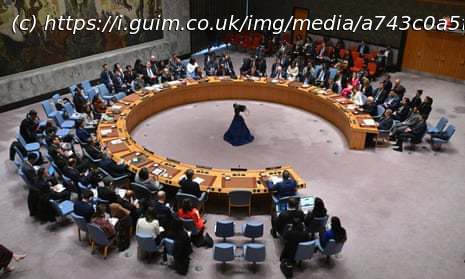Washington’s decision not to use its veto is an acknowledgement of its failure to lead the UN Gaza agenda
Diplomacy occasionally has the capacity to surprise, and when it does it often portends a deep shifting in the landscape.
Few as recently as the end of last week saw much chance that the UN security council would be able to put aside five months of division over Gaza and agree terms for an immediate ceasefire, yet on Monday that is precisely what happened, in no small part due to some British diplomatic persuasion and a significant American change of heart.
As a result the US did not use its veto to block a resolution demanding an immediate ceasefire in Gaza.
What practical difference it makes on the ground in Rafah and Khan Younis it is too early to say, but judging by the initial furious Israeli reaction, and cries of US betrayal, this is about more than some words in the text of a UN resolution: it marks another moment in the painful, almost anguished US diplomatic distancing from its chief ally in the Middle East.
Two weeks ago the terrain looked very different. The US at the UN headquarters in New York had started a concerted effort to reassert its diplomatic leadership role over Gaza. It felt it had been pushed on the back foot, three times vetoing ceasefire resolutions, and wanted to show it could draft a positive policy on Gaza rather than just being cast in the role of Israel’s last diplomatic redoubt.
Yet last Friday this plan fell apart when its lengthy draft resolution was vetoed by Russia and China and rejected by Algeria. The draft was widely billed in the media as backing an immediate ceasefire, but any close examination of the contorted US text showed the sentiments were more complex. It said a ceasefire had to be connected with the release of all hostages, making it a conditional call. The draft also made few explicit demands of Israel, even if many were implied.






